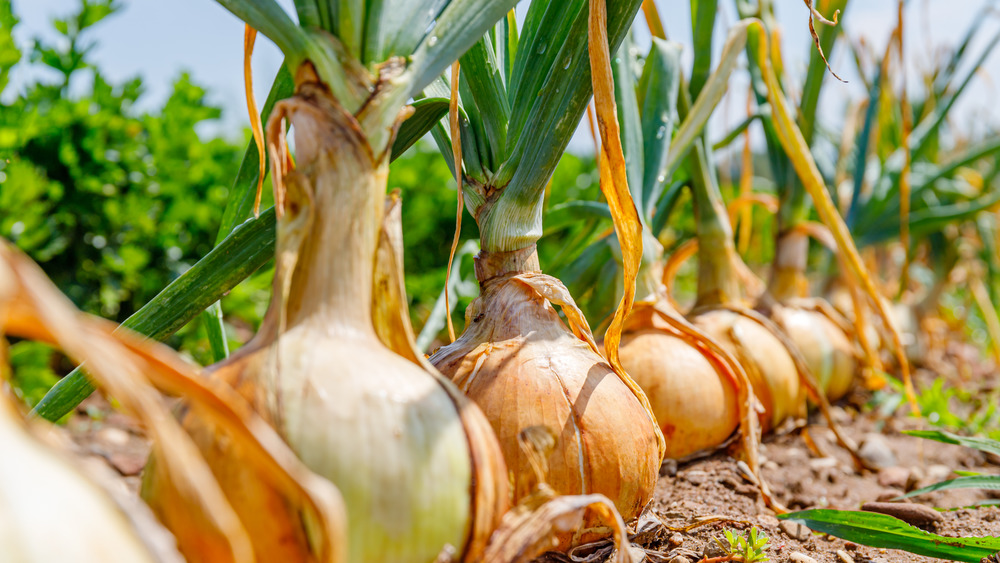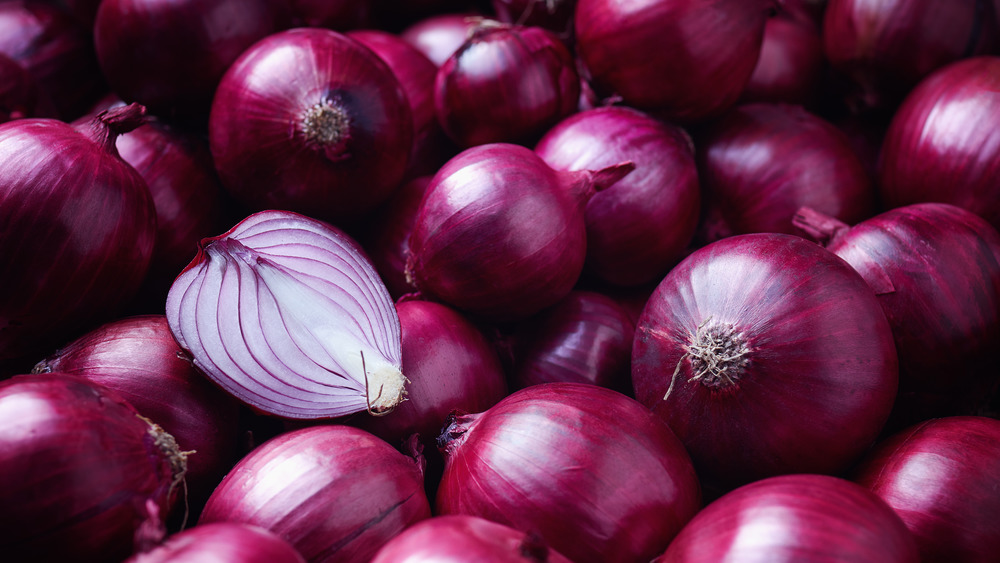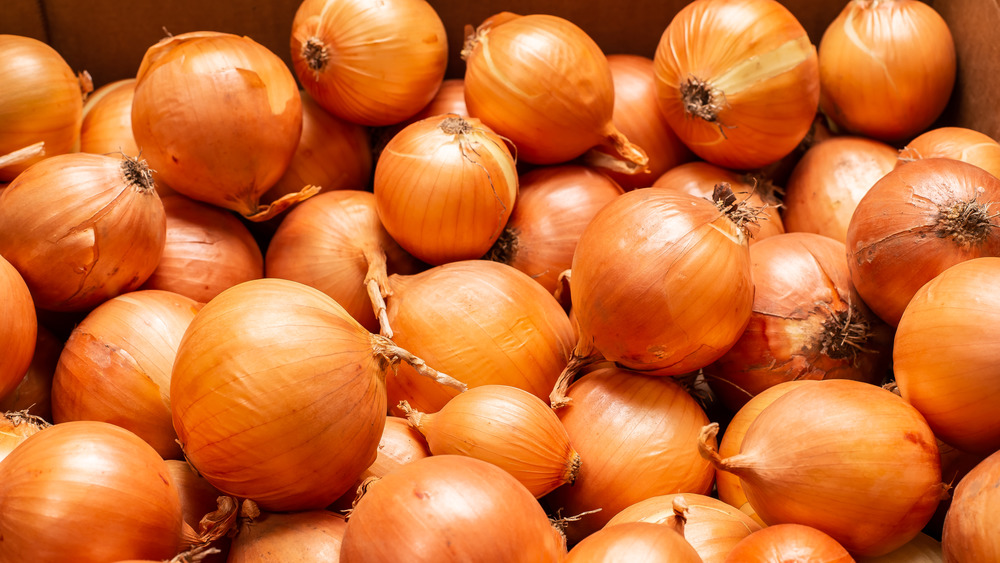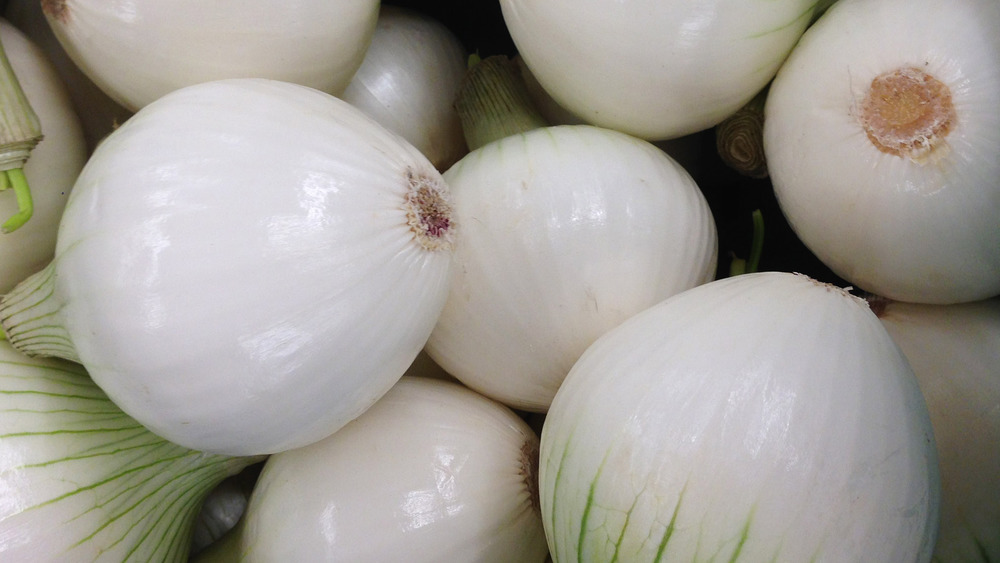How Eating Onions Can Really Benefit Your Health
Onions are an allium vegetable, a group that includes leeks, garlic, chives, and shallots. Onions contain plant compounds, vitamins, and minerals that come with some serious health benefits. As it turns out, people have been using these plants for centuries. Roman soldiers would even munch on some garlic before a battle, and athletes in the first Olympic games in Greece ate them (via a 2015 study).
One medium onion has fewer than 60 calories, 2.52 grams of dietary fiber, 34 milligrams of calcium, 216 milligrams of potassium, 11 milligrams of vitamin C, and plenty of B vitamins, according to USDA FoodData Central. Onions are good for your heart, bones, blood sugar, digestive system, cells and could even play a part in helping prevent certain cancers.
Vitamin C works as an antioxidant, which can aid in disease prevention by protecting your cells against damage, according to a 2013 study. The B vitamins in onions can help with nerve function, red blood cell production, and cognitive decline prevention (via Advances in Nutrition).
Onions also have potassium, a nutrient that only about 3 percent of Americans get enough of (4700 milligrams a day), according to a 2013 study published in Advances in Nutrition. Potassium is essential for muscles, kidneys, nerves, fluid balance, and normal cell function (via a 2016 study).
Onions are good for your heart
According to Healthline, eating onions can help reduce high cholesterol and high blood pressure, and both can lead to heart problems. Researchers gave 162 milligrams of the onion skin extract polyphenol quercetin to overweight participants with high blood pressure. According to a 2015 study in the British Journal of Nutrition, they discovered that it significantly reduced high blood pressure.
Researchers in a 2014 study had 54 women with polycystic ovarian syndrome (PCOS) eat 40 to 60 grams of raw red onions a day and found that it lowered their LDL (bad) cholesterol after eight weeks compared to a control group. In a 2016 study, researchers studied 43,880 healthy men and found that eating onions can reduce nonfatal heart attacks and ischemic stroke risk. The researchers specifically looked at their intake of anthocyanins and flavanones, which can be found in onions.
A 2013 study published in Circulation with 93,600 women found that those who ate more foods rich in anthocyanin were 32 percent less likely to have a heart attack than the women with the lowest anthocyanin intake.
Onions can prevent certain cancers
Garlic and onions can lower the risk of colorectal cancer and stomach cancer. A 2014 review of several studies found that people who eat a high amount of onions and garlic are 22 percent less likely to get stomach cancer than those who don't eat a lot of the vegetable.
A 2014 review of 16 studies on a total of 13,333 people found that people with the highest consumption of allium vegetables had a 15 percent reduced risk of colorectal cancer. Onions and other allium vegetables contain onionin A, a compound containing sulfur, which can slow the spread of lung cancer and ovarian cancer, and can also help reduce tumor growth (via a 2016 study published in Scientific Reports and a 2016 study published in Molecular Nutrition and Food Research). The flavonoids quercetin and fisetin can slow tumor growth, according to a 2018 study and a 2017 study.
Onions are good for your bones and blood sugar
A 2010 study on type 1 and type 2 diabetics found that those who ate red onions significantly reduced their fasting blood sugar levels. The sulfur compounds in onions have an antidiabetic effect, which helps control whole-body blood sugar, according to a 2017 review published in Current Medicinal Chemistry.
Get noshing on some onions to reap the health benefits of improving your bone density. A small 2016 study with 24 postmenopausal women found that those who consumed 3.4 ounces of onion juice every day for eight weeks improved their bone mineral density compared to a control group.
According to a 2018 study published in the Journal of Food and Drug Analysis, onions also have antibacterial properties. Researchers found that onions can fight E.coli, which causes diarrhea; S.aureus, which can cause a staph infection; and Bacillus cereus, which can cause food poisoning.
Onions are good for your digestive system
Onions are also rich in prebiotics and fiber, which can help improve your digestive health. The bacteria in your gut feed on short-chain fatty acids, which can improve digestion, boost immunity, reduce inflammation, and improve gut health, according to a 2014 review published in Advances in Immunology and a 2011 review published in the World Journal of Gastroenterology. Plus, eating foods with prebiotics helps increase probiotics essential for good digestive health (via a 2017 study).
Onions have so many excellent health benefits; they may be the new superfood. Plus, they're easy to add to regular meals. Chop or slice and add to your everyday dishes such as salads, soups, dinners, and omelets. Add caramelized onions to meals by topping your favorite dishes with them. Don't forget about garlic, leeks, chives, and shallots. Add flavor to any of your meals or snacks with these powerful superfoods.





